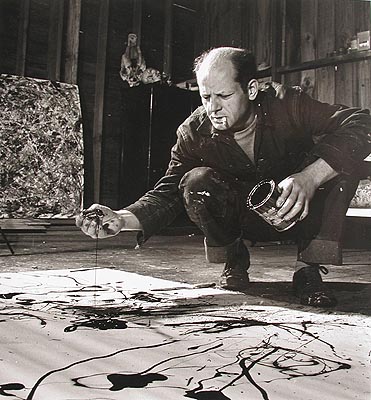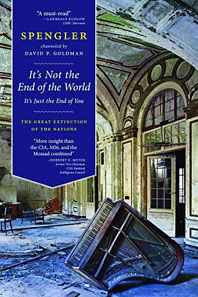True Creativity
 Some excerpts from David P. Goldman’s essay, “Admit It, You Really Hate Modern Art,” in It’s Not the End of the World, It’s Just the End of You: The Great Extinction of the Nations.
Some excerpts from David P. Goldman’s essay, “Admit It, You Really Hate Modern Art,” in It’s Not the End of the World, It’s Just the End of You: The Great Extinction of the Nations.
Why is it that the audience for modern art is quite happy to take in the ideological message of modernism while strolling through an art gallery but loath to hear the same message in the concert hall? It is rather like communism, which once was fashionable among Western intellectuals. They were happy to admire communism from a distance, but very few chose to live under communism.
ABSTRACT ART AND ABSTRACT MUSIC
When you view an abstract expressionist canvas, time is under your control… But when you listen to atonal music, you are stuck in your seat for as long as the composer wishes to keep you. It feels like many hours in the dentist’s chair from which you cannot escape. You do not admire the abstraction from a distance. You are actually living inside it. You are in the position of the fashionably left-wing intellectual of the 1930s who made the mistake of actually moving to Moscow rather than admiring it at a safe distance…
After decades of philanthropic support for abstract (that is, atonal) music, symphony orchestras have to a great extent given up inflicting it on reluctant audiences… The ideological message is the same, yet the galleries are full while the concert halls are empty. That is because you can keep it at a safe distance when it hangs on the wall, but you can’t escape it when it crawls into your ears. In other words, your spontaneous, visceral hatred of atonal music reflects your true, healthy, normal reaction to abstract art. It is simply the case that you are able to suppress this reaction at the picture gallery…
THE REASON FOR ABSTRACT ART
You pretend to like modern art because you want to be creative. At least, you want to reserve the possibility of being creative, or of knowing someone who is creative. The trouble is that you are not creative, not in the least. In all of human history we know of only a few hundred truly creative men and women. It saddens me to break the news, but you aren’t one of them…
Your have your heart set on being creative because you want to worship yourself, your children, or some pretentious impostor rather than the God of the Bible. Absence of faith has not made you more rational. On the contrary, it has made you ridiculous in your adoration of clownish little deities, of whom the silliest is yourself. You have stopped believing in God, and as a result you do not believe nothing, but you will believe in anything (to paraphrase Chesterton)… To demand the attribute of creativity for every human being is the same as saying that everyone should be a little god.
CREATIVITY IS RARE
But what should we mean by creativity? In science and mathematics, it should refer to discoveries that truly are singular, which could not possibly be derived from any preceding knowledge. We might ask: In the whole history of the art and sciences, how many contributors truly are indispensable, such that history could not have been the same without their contribution? There is room for argument, but it is hard to come up with more than a few dozen names…
We can argue about the origin of scientific or artistic genius, but we must agree that it is extremely rare. Of the hundreds of composers employed as court or ecclesiastical musicians during Johann Sebastian Bach’s lifetime, we hear the work of only a handful today. Eighteenth-century musicians strove not for genius but for solid craftsmanship; how it came to be that a Bach would emerge from this milieu has no consensus explanation… If we use the term creative to mean more or less the same thing as irreplaceable, then the number of truly creative individuals appears very small indeed. It is very unlikely that you are one of them.
If you work hard at your discipline, you are very fortunate to be able to follow what the best people in the field are doing. And if you are extremely good, you might have the privilege of elaborating on points made by greater minds. Beneficial as such efforts might be, it is very unlikely that, if you did not do this, no one else would have done it. On the contrary, if you are at the cutting edge of research in any field, you take every possible measure to publish your work as soon as possible, so that you may get credit for it before someone else comes up with precisely the same thing. Even the very best minds in a field live in terror that they will be made dispensable by others who circulate their conclusions first.
A BETTER MOTIVE
If God is the Creator, then imitation of God is emulation of creation. But that is not quite true, for the Judeo-Christian god is more than a creator; God is a creator who loves his creatures. In the world of faith there is quite a different way to be indispensable, and that is through acts of kindness and service…
Bach inscribed each of his works with the motto “Glory belongs only to God” and insisted (wrongly) that anyone who worked as hard has he did could have achieved results just as good. He was content to be a diligent craftsman in the service of God and did not seek to be a genius; he simply was one. That is the starting point of the man of faith. One does not set out to be a genius but rather to be of service; extraordinary gifts are responsibility to be borne with humility. The search for genius began when the service of God no longer interested the artists and scientists…
THE MODERN CULT OF SELF-EXPRESSION
To be taken seriously in the twentieth century, artists had to invent their own style and their own language… To be an important person in this perverse scheme means to shake one’s fist at God and define one’s own little world, however dull, however tawdry, and pathetic it might be. To lack creativity is to despair. Hence the attraction of the myriad ideological movements in art that gives the artists the illusion of creativity.
In their urge toward self-worship, the artists of the twentieth century descended to extreme levels of artlessness to persuade themselves that they were in fact creative. In their compulsion to worship themselves int he absence of God, they produced ideas far more ridiculous, and certainly a great deal uglier, than revealed religion in all its weaknesses ever contrived. The modern cult of individual self-expression is a poor substitute for the religion it strove to replace, and the delusion of personal creativity an even worse substitute for redemption.
 It’s Not the End of the World, It’s Just the End of You
It’s Not the End of the World, It’s Just the End of You
Why do cultures commit suicide? Why are we witnessing a new great extinction of peoples? Why is the economic crisis really a spiritual crisis? Probing the inner workings of civilization in a tour d’horizon of cultural decline, Spengler argues that Europe’s postnational, secular dystopia is a death trap, that the onslaught of modernity has plunged Islam into an even greater crisis, and that the destiny of nations is decided in the human heart, by religion. Christian America, in spite of its follies and gullibility, has the spiritual strength to restore the faith of the West. This book presents, in one comprehensive volume, the wide scope of Spengler’s theories on Christianity, Islam, America, the financial crisis, horror movies, modern art, Israel, Tolkien’s Middle Earth, tribalism, the global balance of power, demography, and sex in the twenty-first century. These highly original essays may provoke you, even frighten you–but never bore you.


























November 7th, 2012 at 11:06 pm
This is an interesting look at the contrast between classical and modern art, and one that reminds me of E. Michael Jones in Dionysus Rising, a book that is admittedly now dated and which I have always found wanting.
Goldberg seems to do a few things that Jones does not: it is interesting to see how atonal music was played only because of immense philanthropy from the wealthy and how different the view of classical artists is from modern.
However, there is a bog question about his study of modern art: why does Goldberg not focus on more popular forms of music and how their creators have changed? Logically, one would assume that changes there would have much greater reflection on changes in mass culture. One could especially look at metal and rap artists who seem to want consistently to create something more and more shocking with each new generation, and how these created music that had to be harder and faster and more politically radical and foul-mouthed than before.
November 10th, 2012 at 1:06 pm
Hi Julien
God point. I suppose it’s because the philosophical underpinnings of mass culture are less subtle! However, it would be interesting to hear what he might have to say about it.